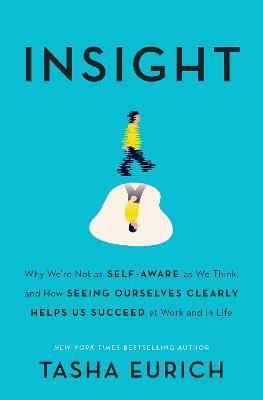Insight – Tasha Eurich

How self-aware are you? How well do you know yourself? Do you know how others perceive you?
See Yourself With Clarity
There are two kinds of self-awareness: internal—how we perceive ourselves—and external—how others perceive us. To be truly self-aware, we need to gain both an internal and external perspective.
To successfully take others’ perspectives in highly charged situations, we should start by “zooming in” on our own perspective first to better understand it.
Next, we should “zoom out” and consider the perspective of the other person.
What Leaders Need To Do
Leadership is not about trying to control every move of the employees. Leaders should help connect their employees with the bigger picture, give them the right tools, and provide them with the space to make mistakes while still holding them accountable.
Don’t Ask Why, Ask What
We usually focus a conversation on why the other person wants to change. There’s a risk that we don’t get to the “actionable” part of our insights or emotions. We need to ask ourselves about the “what.”
Why questions draw us to our limitations. What questions keep us curious. What can I do? What do you like? These kinds of “what” questions are geared towards personal growth and seeing our potential.
The Miracle Question
Suppose that one night, while you are asleep, there’s a miracle and the problem that brought you here is solved. However, because you are asleep, you don’t know that the miracle has already happened. Think for a moment… How’s life going to be different now? Describe it in detail. What’s the first thing you’ll notice when you wake up in the morning?
Daily Check
A simple but powerful tool is to spend five minutes at the end of every day reflecting on the following questions:
What went well today?
What didn’t go well?
What did I learn, and how will I be smarter tomorrow?
Awareness At Team Level: Collective Insight
If being individually self-aware means knowing who you are and how others see you, a self-aware team commits to that same understanding at a collective level.
There are five cornerstones of collective insight that teams can access and address:
- Objectives – What are we trying to achieve?
- Progress – How are we doing?
- Process – The processes we’re employing to achieve our objectives.
- Assumptions – Our assumptions about the business and our environment.
- Individual Contributions – What impact is each team member having on the team’s performance?
Key Questions
Leaders can ask some key questions to their employees to make sure that teams share their collective insight:
- Do we all know the plan?
- Do we all know the status of the plan?
- Are we all aware of the challenges the company is facing?
Reframing
Reframing means that we look at our circumstances, our behaviours, and our relationships from a different angle. I know from experience how easy it can be to be drawn into a single view of a circumstance and therefore struggling to find a good way to change things. We need to instead look at the good and the bad from multiple angles, as a way to help maximise our insights and chances of success.
Mining Solutions
Instead of focussing on the problem all the time, we need to mine solutions, dedicating a good amount of our efforts to exploring different ways of solving a problem.
To increase your ability to mine problems for solutions, try the Miracle Question.

